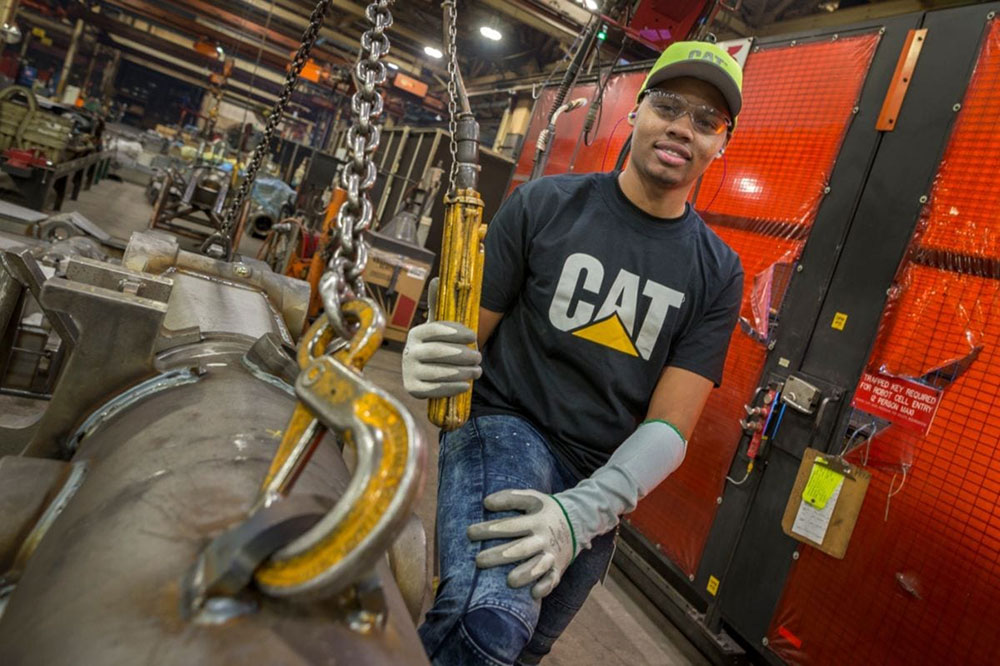Manufacturers can generate business value and close the manufacturing skills gap through Opportunity Employment.
By Nicole Trimble
Despite unemployment being at historic lows, and the stock market continuing to hit new peaks, U.S. income inequality is at an all-time high. Add to this the increased rise of automation, artificial intelligence, and significant demographic shifts, and the outlook for America’s workforce seems uncertain at best. These challenges disproportionately affect frontline employees – those often found in the manufacturing, food-service, and retail industries –who are themselves disproportionately represented by women and employees of color.
These times of change and uncertainty provide employers of frontline talent a unique opportunity to rewire their employment practices to create equitable economic pathways for untapped talent pools while simultaneously adding business value.
At Talent Rewire, we’re partnering with employers to empower them to do just that. We support some of the world’s most recognized brands to pilot innovative, evidence-based Opportunity Employment approaches to recruiting, retaining, and advancing frontline talent in a rapidly changing labor market. As evidenced by the examples that follow, rewiring talent practices to prioritize opportunity and mobility for frontline workers not only helps the individual employee but also generates business value for the company. This is what it means to be an Opportunity Employer.

Caterpillar Inc. is addressing the manufacturing skills gap by looking to untapped talent pools and partnering with local school districts.
One employer in our community that has rewired their hiring practices to meet these challenges is Caterpillar Inc. Caterpillar knew they needed to develop a more diverse talent pipeline within their production facilities. However, the manufacturing skills gap made recruitment of young people a challenge, as did the realities of their geography. One of Caterpillar’s largest locations is in Peoria, Illinois, where 18.1% of African Americans were unemployed—nearly five times the local rate of 4%.
To overcome these challenges, Caterpillar developed a partnership with Manual Academy, a diverse high school with a manufacturing focus, to pilot a new approach for attracting technical talent. The program they created, E4Life, was designed to address education, employment, help establish an economic foundation, and develop essential life skills. Through the partnership, Caterpillar was able to recruit students with technical knowledge who expressed an interest for paid, practical experience in manufacturing while simultaneously earning academic credit.
After completion of E4Life, several students were hired into full-time roles, and Caterpillar has since expanded the program to four school districts with plans to launch it within other divisions of the company. Additionally, the Essential Skills portion of the program was so successful that the Peoria School District incorporated it into their curriculum reaching 6,000 students.
As with all employees, it’s not simply enough to hire individuals from untapped talent pools; more is needed to support them, so they can be successful at home and at work.
The Caterpillar pilot was effective because it didn’t focus solely on providing internships, but went further and provided supports in the form of professional and personal mentors who helped students navigate expectations and organizational culture. Additionally, the Essential Skills portion of the program set the students up for future success whether they decided to continue to pursue a manufacturing career or not.
Another employer in our community who offers innovative post-hire employee supports is Tyson Foods.
Many of Tyson’s employees are immigrants or new Americans who have varying levels of education, limited access to social resources, and experience language and cultural barriers that create professional and personal challenges. To address these challenges, Tyson partnered with adult education providers and nonprofits to launch a workplace education pilot offering free English, GED, financial literacy, and U.S citizenship classes, as well as other life skills training.
Through our Rewire Lab and with the help of the ROI Institute, Tyson found that this effort produced a 123% ROI through stronger employee retention. Due to the pilot’s popularity and strong results, Tyson formalized it into a workplace education program called Upward Academy and expanded it to 36 locations across seven states.
There are countless other companies doing incredible work attracting and supporting employees such as Rhino Foods’ work to provide employees pay advances and build credit, and Dave’s Killer Bread’s commitment to hiring people who have been incarcerated. Regardless of the focus of the individual program, and at a time when businesses are being called on to do more for their employees and play a larger role in society, companies who embrace Opportunity Employment will gain a competitive advantage, making them a better business – for all.
To learn more about Opportunity Employment and how your business can invest in your frontline employees, we encourage you to take the Opportunity Navigator assessment and get connected to the resources that can help deliver the most impact.

Nicole Trimble
As the Managing Director of Talent Rewire at FSG, Nicole Trimble leads a community of pioneering employers and workforce partners interested in piloting innovative best practices around hiring, retention, and the advancement of Opportunity Employment. The Opportunity Navigator is a joint collaboration between Talent Rewire and Grads of Life.
Contact info:
talentrewire.org
Email: talentrewire@fsg.org
Scott Ellyson, CEO of East West Manufacturing, brings decades of global manufacturing and supply chain leadership to the conversation. In this episode, he shares practical insights on scaling operations, navigating complexity, and building resilient manufacturing networks in an increasingly connected world.